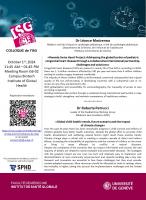
«Rwanda Swiss Heart Project: Addressing the global burden of pediatric congenital heart disease through a collaborative international partnership, challenges and solutions» / «Global child health trends, future scenario and the impact of climate change»
01.10.2024 11:45 – 13:45
«Rwanda Swiss Heart Project: Addressing the global burden of pediatric congenital heart disease through a collaborative international partnership,
challenges and solutions»
Congenital heart diseases (CHD) are present in nearly 1% of live births; according to WHO, there are 1. 5 million newborns affected by CHD per year and more than 4 million children waiting for cardiac surgery treatment worldwide.
The majority of these children (90%) could be treated, saved and subsequently have a good quality of life but unfortunately, in developing countries with a suboptimal care or no access to care, they are destined to die.
With globalization and accessibility for echocardiography, the inequality of access to care are being recognized.
Building cardiovascular centers through a sustained strong international partnership is a key strategy to build, strengthen, and maintain competence of healthcare workers.
«Global child health trends, future scenario and the impact of climate change»
Over the past 30 years there has been remarkable progress in child survival and millions of children globally have better health outcomes. Despite the global effort to promote child health, development and wellbeing, several factors might revert these positive trends.
Climate change plays a critical role in creating a complex cascade of direct and indirect effects, increasing the vulnerability of populations and the number of children on the move or living in areas affected by conflict or natural disasters.
Despite the complexity of the scenarios that can impact child health and survival, the vast majority of deaths are related to easily treatable and preventable diseases. The strategies with the greatest impact are low cost, low tech and relatively easy to implement, and decentralization of care, community empowerment and capacity building play a key role.
Research and innovation are essential to face these challenges, but they must provide context-adapted responses. More resources should be allocated to trials in settings where the mortality is higher, taking into account the implementation challenges and the limited resources.
Lieu
Bâtiment: Campus Biotech
Institute of Global Health, Meeting room G6-02
Organisé par
Institut de santé globaleIntervenant-e-s
Léonce MWIZERWA, Médecin chef de clinique en cardiologie pédiatrique, Unité de cardiologie pédiatrique, Département de la femme, de l'enfant et de l'adolescent Hôpitaux Universitaires de GenèveRoberta PETRUCCI, Leader of the Paediatrician Working Group Médecins Sans Frontières (MSF)
entrée libre
Inscription
Date limite d'inscription: 30.09.2024
Registration is mandatory
This presentation validates 2 credits in Prevention and Public Health (CHF 25.-)
Fichiers joints
| Colloque_ISG_01OCT_L_Mwizerwa_R_Petrucci.jpg | 307.2 Kb |

 haut
haut